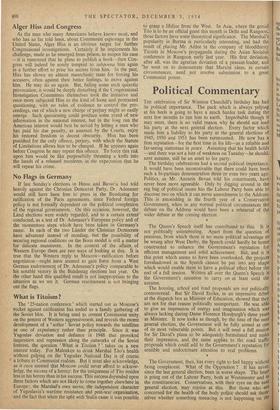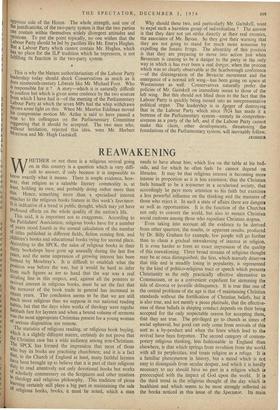Political Commentary
THE celebration of Sir Winston Churchill's birthday has had its political importance. The pack which is always yelping at his heels is going to have a much harder task during the next few months to run him to earth. Improbable though it may seem, there is no valid reason why he should not lead his party at the next general election. Every factor which made him a liability to his party at the general elections of 1945, 1950 and 1951 has been surmounted. He now has a firm reputation—for the first time in his life—as a reliable and far-seeing statesman in peace. Assuming that his health holds —and there was not a hint of weakness on Tuesday—he should, next autumn, still be an asset to his party. The birthday celebrations had a second political importance. It would have been inconceivable that there could have been such a bi-partisan demonstration three or even two years ago. Politics, as Mr. Aneurin Bevan told his constituents, have never been more agreeable. Only by digging around in the rag bag of political issues has the Labour Party been able to discover two on which it can move amendments to the Address. This is astonishing in the fourth year of a Conservative Government, when in any normal' political circumstances the debate on the Address would have been a rehearsal of the wider debate at the coming election.
* The Queen's Speech itself has contributed to this. It is not politically uninteresting. Apart from the question of pensions, from which there is no more political advantage to be wrung after West Derby, the Speech could hardly be better constructed to enhance the Government's reputation for efficient management and solid achievement. But, and it is this point which seems to have been overlooked, the projects foreshadowed in the Speech cannot be put into any shape which would enable them to have a political effect before the end of a full session. Written all over the Queen's Speech is the Government's intention to carry on at least until the autumn.
The housing, school and road proposals are not politically controversial. But Sir David Eccles, in an impressive debut at the dispatch box as Minister of Education, showed that they are not for that reason politically unimportant. He was able to give an impression of energy and imagination which was always lacking during Dame Florence Horsburgh's three years as Minister. It now looks as though. by the time of the next general election, the Government will be fully armed at one of its most vulnerable points. But it will need a full session for Sir David's plans to be adequately formulated and make their impression, and the same applies to the road traffic proposals which could add to the Government's reputation for sensible and undoctrinare attention to real problems.
The Government, then, has every right to feel happy without being complacent. What of the Opposition ? It has never, since the last general election, been in worse shape. The heart is going out of the Labour Party, both at Westminster and 01 the constituencies. Conservatives, with their eyes on the next general election, may rejoice at this. But those who 4ire concerned for the health of the body politic should ask them' selves whether something menacing is not happening on the opposite side of the House. The whole strength, and one of the justifications, of the two-party system is that the two parties can contain within themselves widely divergent attitudes and opinions. To put the point topically, no one wishes that the Labour Party should be led by pacifists like Mr. Emrys Hughes. But a Labour Party which cannot contain Mr. Hughes, which has no place for the ILP tradition which he represents, is not fulfilling its function in the two-party system.
This is why the blatant authoritarianism of the Labour Party leadership today should shock Conservatives as much as it does nineteenth-century Liberals like Mr. Michael Foot. Who Is responsible for it ? A story—which it is naturally difficult to confirm but which is given some credence by the two sources from which I have had it—of the meeting of the Parliamentary Labour Party at which the seven MPs had the whip withdrawn throws some light on this. When Mr. Maurice Edelman moved his compromise motion Mr. Attlee is said to have passed a note to his colleagues on the Parliamentary Committee suggesting that it should be accepted. The two men who, without hesitation, rejected this idea, were Mr. Herbert Morrison and Mr. Hugh Gaitskell. Why should these two, and particularly Mr. Gaitskell, want to expel such a harmless group of individualists ? The answer is that they dare not yet strike directly at their real enemies, the associates of Mr. Bevan. Sc they give their warning that they are not going to stand for much more nonsense by expelling the lunatic fringe. The absurdity of this position is that they are preparing to move into action just when Bevanism is ceasing to be a danger to the party in the only way in which it has ever been a real danger. when the process which was so clearly observable at the Scarborough conference —of the disintegration of the Bevanite movement and the emergence of a normal left wing—has been going on apace at Westminster as well. Conservatives naturally prefer the policies of Mr. Gaitskell on immediate issues to those of the left wing. But this should not blind them to the fact that the Labour Party is quickly being turned into an unrepresentative political organ. The leadership is in clAnger of destroying that in the Labour Party which since 024 has made it a buttress of the Parliamentary system—namely its comprehen- siveness as a party of the left, and if the Labour Party cannot make this claim, other developments, threatening the foundations of the Parliamentary system, will inevitably follow.
fRIMMER











































 Previous page
Previous page